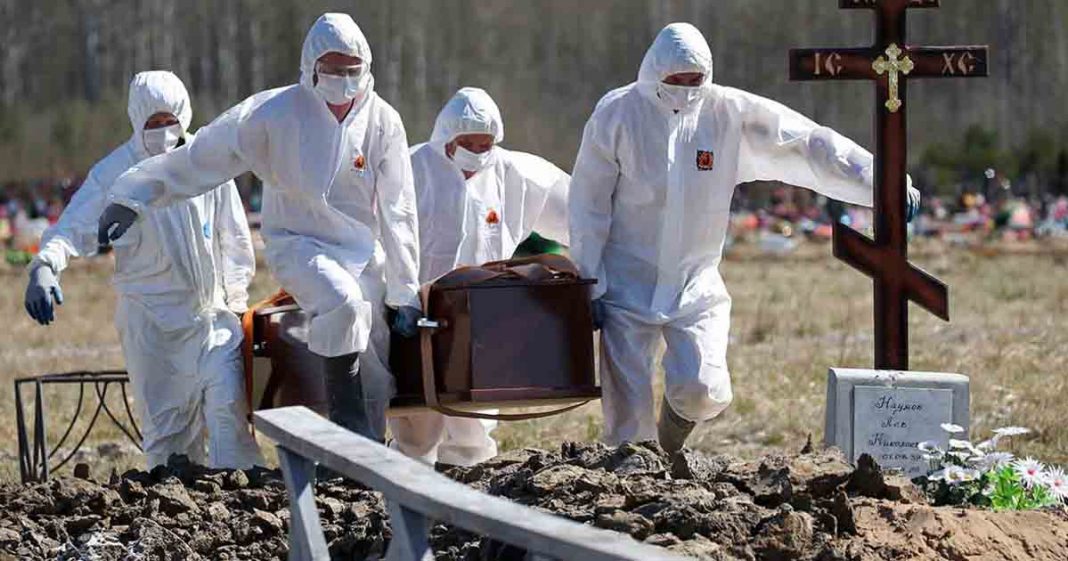Russia’s relatively low number of Covid-19 fatalities has been labeled “unusual” by Michael Ryan, a World Health Organization (WHO) official. He said the low count could be down to the way the country is classifying deaths.
Speaking at a press conference, the executive director of the WHO Health Emergencies Programme said Russia’s stats are an outlier compared to other European nations, but that he does not believe the country is covering up the scale of pandemic.
Russia’s low coronavirus death rate: an anomaly
“The low death rate is difficult to understand in the context of the population and the health systems across the European region being quite similar in terms of their sophistication and availability,” Ryan said. “The age profile of people in the Russian Federation is not greatly different to that of other nations; neither is the profile of people with underlying conditions.”
Russia is suffering from the 3rd-largest #COVID-19 outbreak in the world, w/ >449,000 cases. Officially, #Russia's death rate is at around 1% – significantly lower than that of other countries w/ similarly large outbreaks. @novaya_gazeta investigated how. https://t.co/NztnchtSLt
— Hromadske Int. (@Hromadske) June 5, 2020
Despite having the third most confirmed cases, Russia is 13th in terms of official Covid-19 deaths, which makes it a significant outlier. For example, Russia (with 502,436) has almost double the known infections of the United Kingdom (290,143), but one sixth the number of deaths (6,532 compared to 41,128).
Ryan stressed that the approach to counting fatalities varies from country to country, and that he does not believe Russia is purposefully downplaying its figures, saying: “I don’t think that’s been done in any negative way, not in a systematic fashion.”
The WHO official said one reason for Russia’s low mortality rate could be mass testing, which was ramped up early on, but noted that in other countries with a large number of tests, mortality is still higher. Russia has conducted at least 13.8 million tests – the second highest number in the world.
Speaking to journalists on Thursday, President Vladimir Putin’s official spokesperson Dmitry Peskov disagreed that the statistics were “unusual” and said the media should wait for Russian “epidemiologists to give appropriate explanations” about the methodology.
When asked whether the Kremlin gave recommendations to Russia’s sanitary watchdog to heed the opinion of the World Health Organization, Peskov noted that the Russian watchdog was in contact with the WHO. “Therefore, I think they will tackle the issue and answer all questions from the World Health Organization. I have no doubt about that,” he said.
Peskov refrained from commenting on the difference between the existing methods for assessing the coronavirus mortality rate. “No, I can hardly explain anything here. I do hope that our epidemiologists will provide the appropriate explanations,” he said.
Could herd immunity be possible?
As testing ramps up, a growing number of Russians are discovering that they have already had Covid-19. Results show almost 14 percent of people have immunity, meaning millions may have been infected. This research has opened up the possibilities of herd immunity in Russia, as most of the population studied possesses the necessary antibodies.
Russia is one of the most affected countries by the novel coronavirus, with cases numbering more than 500,000, putting it behind Brazil and the United States and third overall in the world’s most infected countries.
Read more: Herd immunity in Russia: millions have Covid-19 says new data
Speaking at a meeting of the national Council for Combating Coronavirus, Anna Popova, Rospotrebnadzor’s chief, said the latest data shows how immunity has spread through different age groups.
Popova noted that children were found to have the highest level of immunity, with almost 20% of under-17s having immunity.
The proportion of the population which must be immunised in order to achieve herd immunity varies for each disease but the underlying idea is simple: once enough people are protected, they help to protect vulnerable members of their communities by reducing the spread of the disease.
The recent discovery of antibodies in millions of Russians has indicated that the country may well be on its way toward herd immunity.
Russia rolls out new coronavirus drug
Russia on Thursday rolled out a drug approved to treat patients suffering from the novel coronavirus, its state financial backer said, as the number of infections there surpassed half a million.
The first deliveries of the new antiviral drug, registered under the name Avifavir, were made to some hospitals and clinics across the country, Russia’s RDIF sovereign wealth fund said in a press release. RDIF has a 50% share in a joint venture with the drug’s manufacturer ChemRar that runs the trials.
The health ministry gave its approval for the drug’s use under a special accelerated process while clinical trials, held over a shorter period and with fewer people than many other countries, were still underway.
RDIF chief Kirill Dmitriev last week told Reuters the plan was for ChemRar to manufacture enough of the drug to treat around 60,000 people a month.
Dmitriev on Thursday said more than 10 countries had made requests for Avifavir supplies.
RT with additional input by GVS News Desk
What are your views on this? Share with us in the comments bar below.














